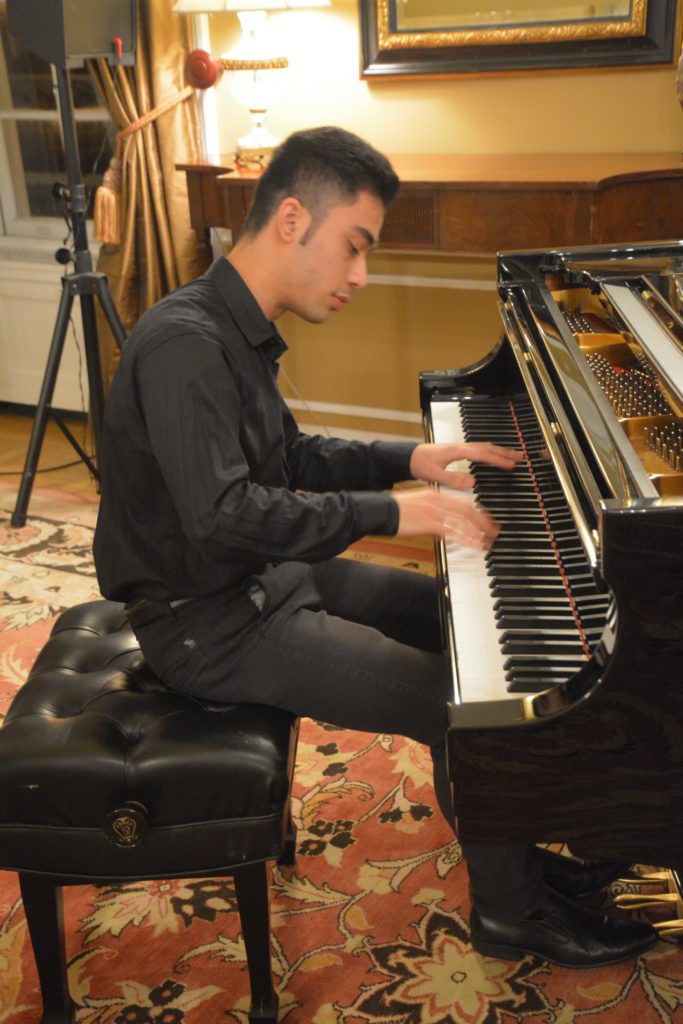A Young Pianist Plays Chopin at Afghan Embassy
By • November 25, 2019 0 2579

Classical musicians — especially pianists about to embark on an evening’s work — vary in their approach to the occasion. Some make the grand entrance, a flourish, in a tuxedo, and continue on, giving a performance. Some are intently focused on the music, trying to achieve the ever-elusive goal of perfection, brows furrowed, as if about to embark on a difficult journey.
When you watched Elham Fanoos take his seat at a piano at the Embassy of Afghanistan in a Nov. 22 Embassy Series appearance, with all the audience members in their chairs, the introductions served, the occasion duly noted, you barely noticed that he’s about to begin. The concert was part of founder and director Jerome Barry’s 26th season of practicing musical diplomacy.
Slight of build, young — he’s 22 now — he sat down in a whisper, composing himself. Deep breath, and he began, without much ado, without words. It’s like watching someone disappear into a bath of music, and reappear in full with the first note.
He looked a little weightless. He just sort of appeared, embarking on an nearly two-hour visitation. He brought with him not just the inevitable foray for a pianist into Chopin, but on this night also music by the other tragic prodigy, Mozart, and Robert Schumann’s “Fantasiestücke,” Op. 12.
There was, in addition, the trips into his own culture: an arrangement of an Afghan song by Ahmad Zahir, and his arrangement of a song by Shankar Singh from a Bollywood film called “Mera Naam Joker” (“My Name is Joker”), about the life of a classic clown, not of the current box-office nemesis.
As he did at a previous concert at the Afghan Embassy, Fanoos came as a bearer of gifts, not just musical, but the story of his own history, which has considerable weight and twists and turns. Apart from having talent and charm to burn, he has traveled from war-torn Afghanistan, where he managed to attend a music school with only one piano, a school surviving in the midst of struggle and danger, which influenced and informed his ambitions and worldview.
Although he may seem too transparent, too open like a window, he brings a face and presence that has already seen and experienced a lot. By education and profession, Fanoos is a classical pianist, but he is also a young man from Kabul, which brings its own noise, its own memories.
In the American mind, Afghanistan remains a haunted place for the servicemen and soldiers who have served and sometimes suffered there and still do. Afghanistan is and was also Fanoos’s home, the place, a place of noise and violence and danger, which has been struggling to rise above the dangers and clichés of religions, and seemingly endless invasions, civil strife and conflict. It remains a region of unfulfilled possibilities.
One of those possibilities is the Kabul-born Fanoos, whose Indian father was a popular singer of classical and traditional music. When the Taliban took over the governance of Afghanistan, singing and music were banned.
The Taliban presence, but not its rule, remains, and the endless small battles remain and the efforts at reconciliation remain, but music has changed the prospect of possibilities.
His early interest in music became evident to others, and he was able to be sent to the Afghanistan National Institute of Music in Kabul. It was a musical academy created and directed and created in 2010 by Ahmad Sarmast, where he began to study piano and discovered his affinity and love for the instrument, not to mention Mozart and then Horowitz.
“There was only one instrument in the whole school, and students would stand in line for a few minutes of time,” he told us upon the occasion of his first Embassy Series concert appearance. “Sometimes, in Kabul, I saw a piano in a hotel, and I would sit there and practice when I could.”
In Kabul, he was fortunate enough to escape a suicide bomb attack on the school because he had arrived late for class.
From Kabul, he went to New York and Hunter College, where he received a degree this year and is continuing his education. He played at the Kennedy Center as part of the Afghanistan National Institute of Music Orchestra, and he performed at Carnegie Hall at the 2017 Anne Frank Awards Ceremony, in a solo recital for Women for Afghan Women.
“I want to let the world see what possibilities exist in Afghanistan in spite of the war and conflicts, that we have something to offer,” he said.
“I wanted to be a concert pianist from Afghanistan, and to give other artists from my country the same opportunities, and I wanted people to see my country as something more than war-ridden, that it had hope and a future.”
The answer for Fanoos was music: “It is the heart, the emotion. When you play Chopin, Mozart, those conflicts recede and we are together, not apart.”
Seeing him now, you see a young man playing with self-assurance, letting the music flow through him. He remains a thoughtful, articulate artist and musician. “When I came to New York for the first time, you could feel the difference right away, you could wear anything you wanted, speak freely, not feel fear, meet with people. The freedom was very exhilarating,” he said.
Chopin is always with him: “I wanted to flood the world with Chopin.”
Last Friday, at the Embassy of Afghanistan, with Chopin nocturnes, etudes and scherzos, the floodgates opened again.

